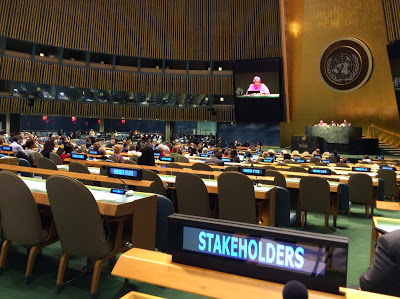This is a guest post by Dr. Ulrich Graute. He is an International Cooperation and Development Expert (UN, EU, national) and Senior Adviser, as well as a board member of the Regional Studies Association. Ulrich represents the RSA at a UN General Assembly Hearing on the Post 2015 Development Agenda on 26 and 27 May and volunteered to keep us up to date with the latest developments.
 |
| The UN called non-state stakeholders for a hearing but many member states didn’t show up to hear them |
Squaring the circle: engaging academia and countless non-governmental organisations in the process to develop one new development agenda for the world
Engaging academia is already a challenge for politicians. On my way to New York I was reading the new RSA publication “Spatially Rebalancing the UK Economy: The Need for a New Policy Model”. The pamphlet recalled to my mind how easily politics can miss the right direction and generate imbalance and inequality. Of course, it gives also an example on what academia has to say and how researchers and scholars can contribute to new policies and developments. Last but not least, what the case of the UK also demonstrates is that academic advice is often ignored and – as in case of the UK – couldn’t prevent negative developments of the past and present.
What’s at stake at the UN is an even bigger challenge: It’s about a new development agenda for the entire world – and eradication of poverty until 2030 is only one of the abitious goals. Resilient cities is another goal. Overall, most of the 17 proposed Sustainable Development Goals (SDG) target at having an impact on the territory around the world. The agenda is not only very ambitious, it also has a universal and transformative character. Thus, it is adressed even to you dear reader of these lines!
Participating NGOs don’t accept the role assigned to them
About 200 representatives of non-governmental organizations, civil society, major groups (one of them being academia) and the private sector meet today and tomorrow (26 and 27 May 2015) with representatives of the UN and its member states at the UN General Assembly Hall in New York for a hearing on the new agenda and its SDGs, which member states are about to launch at a special UN Summit this September.
The UN tried its best to pick speakers who can represent the wide range of groups adressed by the hearing. But it doesn’t work. Already in the opening plenary Heather Grady spoiled the show: She came to New York as vice president of Rockefeller Philanthropy Advisors but the group of philantropic institutions includes about 200.000 philantropic foundations in the US and Europe alone. There is no way and interest to represent them all. The same is true for me as RSA which is one big but certainly not the only academic association. Thus, there is a big dilemma: The UN needs the support of all the stakeholders invited but the limited number of stakeholders who came and fit into the General Assembly Hall is neither representative nor are they organized. I wonder how this will work out during this hearing?